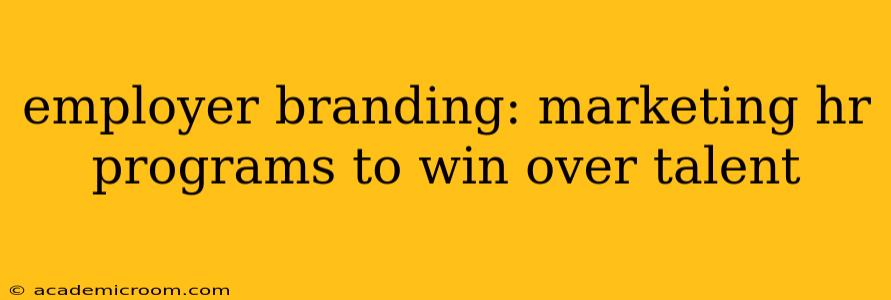In today's competitive job market, attracting and retaining top talent is crucial for any organization's success. Employer branding isn't just about creating a pretty logo; it's a strategic marketing approach that positions your company as an employer of choice. This involves crafting a compelling narrative that showcases your company culture, values, and employee experience, ultimately attracting the best candidates. Effectively marketing your HR programs is key to achieving this. This article explores how to leverage marketing principles to enhance your employer brand and win over top talent.
What is Employer Branding?
Employer branding is the process of building a reputation as a great place to work. It's about projecting a consistent and positive image of your company to potential employees, current employees, and the wider community. A strong employer brand attracts high-quality candidates, reduces recruitment costs, and improves employee retention. It’s essentially marketing your company as a desirable workplace.
How to Market Your HR Programs to Attract Top Talent
Marketing your HR programs requires a multifaceted strategy, mirroring effective marketing campaigns for products or services. Here's a breakdown:
1. Define Your Employer Value Proposition (EVP)
Before you start marketing, you need a clear understanding of your EVP. What makes your company a desirable place to work? Is it competitive salaries, excellent benefits, a positive work culture, opportunities for growth, or a unique mission? Your EVP should be concise, authentic, and resonate with your target audience.
2. Identify Your Target Audience
Who are you trying to attract? Understanding the demographics, interests, and career aspirations of your ideal candidates is critical. Tailor your messaging to resonate with their needs and desires. Are you targeting recent graduates, experienced professionals, or a specific skillset? The more targeted your approach, the more effective your marketing will be.
3. Highlight Your Best HR Programs
What unique employee benefits and programs do you offer? Showcase them prominently. This might include:
- Competitive compensation and benefits: Health insurance, retirement plans, paid time off, and other perks.
- Learning and development opportunities: Training programs, tuition reimbursement, mentorship programs.
- Flexible work arrangements: Remote work options, flexible hours, compressed workweeks.
- Employee recognition and rewards: Awards, bonuses, and other incentives.
- Wellness programs: Health and wellness initiatives, employee assistance programs.
- Social responsibility initiatives: Community involvement, sustainability programs.
4. Develop Engaging Content
Use various channels to communicate your employer brand and HR programs:
- Career website: A user-friendly website with detailed information about your company culture, values, and open positions.
- Social media: Engage with potential candidates on platforms like LinkedIn, Twitter, and Instagram. Share employee testimonials, company news, and behind-the-scenes glimpses of your workplace.
- Employee referral programs: Encourage your employees to refer their network.
- Recruitment marketing campaigns: Targeted advertising on job boards and social media.
- Employer branding videos: Showcase your company culture and employee experiences.
- Blog posts and articles: Share insights into your company culture, values, and employee benefits.
5. Leverage Employee Advocacy
Your current employees are your best brand ambassadors. Empower them to share their positive experiences on social media and with their networks. Encourage employee testimonials and case studies.
People Also Ask (PAA) Questions & Answers
Here are answers to frequently asked questions about employer branding and marketing HR programs:
How can I measure the effectiveness of my employer branding efforts?
Track key metrics such as application rates, time-to-hire, employee retention rates, and social media engagement. Use analytics to understand which marketing channels are most effective.
What is the difference between employer branding and recruitment marketing?
Employer branding is the long-term strategy of building a positive reputation as a great place to work, while recruitment marketing is the short-term activity of attracting candidates for specific job openings. Recruitment marketing is a part of employer branding.
How can I build a strong employer brand on a limited budget?
Focus on organic marketing strategies such as employee advocacy, content marketing, and optimizing your career website. Leverage free social media platforms.
How important are employee reviews in employer branding?
Employee reviews on sites like Glassdoor are highly influential. Address negative reviews constructively and highlight positive feedback. Transparency and authenticity are key.
How can I ensure my employer branding is authentic?
Be genuine and transparent in your messaging. Don't try to portray a false image of your company. Focus on your company's unique culture and values.
By implementing a comprehensive employer branding strategy and effectively marketing your HR programs, you can attract top talent, build a strong company culture, and ultimately drive business success. Remember that employer branding is an ongoing process requiring consistent effort and adaptation to the ever-evolving job market.
